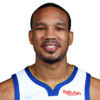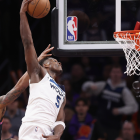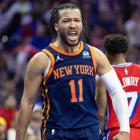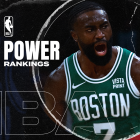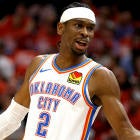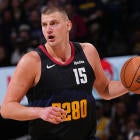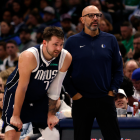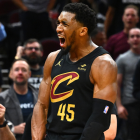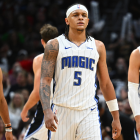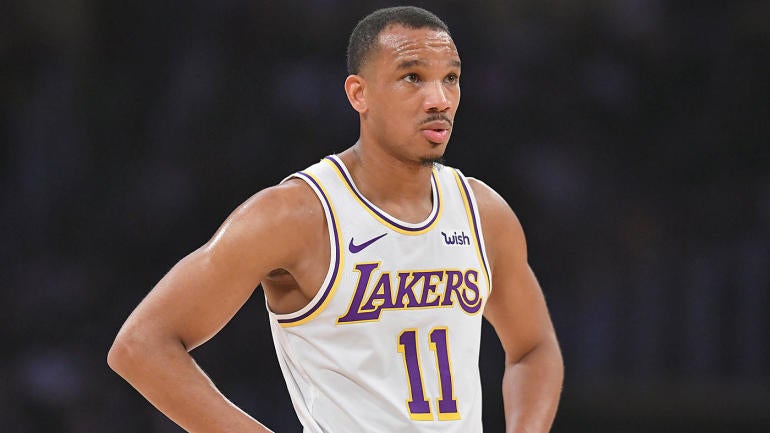
Avery Bradley wasn't the first player to decide not to play when the NBA season resumes at Disney World in Orlando, but he is by far the most important to do so thus far. Davis Bertans and Trevor Ariza may hold similar value as players, but neither plays for a contending team. Bradley's Los Angeles Lakers have a legitimate chance to win the championship, and he was their starting point guard. Now the Lakers have a seven-day transaction window a month before play resumes to figure out how to replace one of their most important players.
How will they do it? To figure that out, we need to start by assessing what the Lakers are really losing with Bradley out. We'll start with the end of the court for which he is known: his defense.
Bradley's impact on defense
Bradley certainly looks like a stopper. Imagine trying to score with someone hounding you like this:
Few guards in all of basketball put this much pressure on the ball so consistently, and it simplifies everyone else's job. The Lakers lead the NBA in blocks in part because of their excellent big men, but Bradley is what puts them in position to block shots in the first place. His willingness to fight through any screen allows the Lakers to largely play traditional pick-and-roll coverage, dropping their centers into the paint to deny anything at the rim. Bradley routinely blows such plays up before they even get there. He is utterly relentless, and it's hard to ignore on tape.
The anecdotal evidence favors the idea of Bradley as an elite defender as well. Teammates and coaches have been praising him since training camp. "We've got two of the best players in the world competing together and all anybody's talking about is Avery Bradley's tenaciousness," Frank Vogel said in September. Anthony Davis and LeBron James have offered similar tributes. Actual contributions aside, the Lakers believe Bradley is a defensive superstar, and that matters. He is the tone-setter for one of the NBA's best defenses.
But is he one of its most important players? That's a bit harder to say. Metrics have always been unkind to Bradley. He is ranked third among all point guards in Defensive Real Plus-Minus, but he is ranked only ninth on the Lakers in Defensive Win Shares and 11th in Defensive Box Plus-Minus. Most damning of all? The Lakers don't really seem to miss him when he goes to the bench, allowing only 1.2 more points per 100 possessions without him than with him. That trend has existed for most of Bradley's career. While he looks like one of the best defenders in basketball, his teams tend to do just fine without him.
| Team | Defensive Rating with Bradley | Defensive Rating without Bradley | Difference |
|---|---|---|---|
2019-20 Lakers | 104 | 105.2 | -1.2 |
2018-19 Grizzlies | 111.1 | 109.2 | +1.9 |
2018-19 Clippers | 109.9 | 109 | +0.9 |
2017-18 Clippers* | 101.8 | 112.4 | -10.6 |
2017-18 Pistons | 109.1 | 101.1 | +8.0 |
2016-17 Celtics | 108.7 | 105.9 | +2.8 |
2015-16 Celtics | 103.9 | 98 | +4.9 |
2014-15 Celtics | 102.8 | 101.5 | +1.3 |
*only played six games
Some of these numbers are explainable in a vacuum. Sharing so many minutes with Isaiah Thomas, for instance, likely contributed to Boston's defensive improvement with him on the bench. But the pattern is alarming. Bradley's former teammate, Marcus Smart, has played for a team that was better defensively with him on the bench only once in his entire career. The sample is significantly smaller, but the difference between the Lakers with Alex Caruso on the floor defensively and without him has been gargantuan three seasons in a row. None of this makes Bradley a bad defender. But very few guards are capable of demonstrably improving defenses consistently, and Bradley doesn't appear to be one of them.
Bradley's best defensive trait has drawbacks in a team system. He's obsessive when it comes to ball-denial, and that comes at the expense of providing solid help defense. His overeager style leaves him susceptible to late rotations and designed off-ball actions:
He could be better off the ball, but many of his issues boil down to size. Bradley is only 6-2. His 6-7 wingspan allows him to play ballhawk in passing lanes, but he provides next to no resistance at the rim:
He's also vulnerable to switches against the right scorers. Kawhi Leonard is likely the single-most important opposing scorer the Lakers will face in the playoffs, and he shoots over Bradley easily:
Smaller guards aren't automatically bad team defenders. Chris Paul and Kyle Lowry stand out, but their low centers of gravity give them an advantage against bigger players. Bradley has never shared their aptitude for switching, helping and post-defense. In that sense, his mere presence provides an exit valve offensively. The gigantic Lakers were hardly lacking for size before this, but that their defense is going to get even bigger now is one of the pluses here.
Make no mistake, the Lakers are going to miss Bradley at the point of attack. Flaws or no, he drives ball-handlers crazy. It just so happens that this season, that is a less valuable postseason skill than it ordinarily would be. Bradley has had quite a bit of success against Stephen Curry, for instance, but with Curry's Warriors out of the picture unusually early, that does the Lakers little good. The same can be said of Kyrie Irving. In a different bracket, Bradley's absence would be devastating. This season? It's harmful, but not without its benefits.
That is especially true if you assume that the Lakers were going to have to mix up their defensive scheme a bit in the playoffs anyway. Pure drop coverage against Leonard leads to death by a 1,000 mid-range jumpers. Small-ball is a postseason certainty, and with it comes an increased emphasis on switching. Caruso and Kentavious Caldwell-Pope can both provide strong ball pressure, but have bodies and mindsets that allow for more defensive versatility. The Lakers are going to have a different sort of defense in the playoffs, but if minutes are allocated correctly, it doesn't necessarily need to be a worse one. Replacing Bradley's offense, especially in light of how well he was playing before the hiatus, will be a bit more complicated.
Bradley's impact on offense
If Bradley is a bit overrated on defense, he makes it up by being a tad underrated offensively. That is a relatively recent phenomenon, though. As recently as the beginning of the 2019-20 season, Bradley's mid-range proclivities severely limited his offensive value. Prior to this season, he took nearly as many long 2-pointers (31.6 percent of his shot attempts) as he did 3-pointers (32.2). That trend continued for the early portion of this season. Bradley left points and space on the board by stepping inside of the arc before firing away.
But something changed near the end of January. In his last 19 games, he has attempted 5.2 3-pointers per game, up from only 2.5 in his first 30, and he has made 42.2 percent of him long-range attempts in that span. More importantly, over 60 percent of his total attempts have come from behind the arc since then. Among rotation Lakers, only Danny Green dedicates more of his shots to 3-pointers.
Bradley embracing analytics was a critical development for the Lakers based on their shot profile as a team. They entered the hiatus 23rd in the NBA in 3-point attempt rate, as only 35.5 percent of their shot attempts came from beyond the arc. The Milwaukee Bucks, by comparison, are fourth at 42.3 percent. Assuming seeding holds, the Lakers would essentially start every NBA Finals game down by several points by mere math.
Offenses simplify in the playoffs, and that will prove especially true for the Lakers as they downsize. Frank Vogel dedicates the fifth-fewest possessions to pick-and-roll in basketball largely because he doesn't have the spacing to run it properly. When Anthony Davis slides over to center, he and LeBron James are going to spam the play. Having competent and willing shooters around them will be critical. Bradley, after spending years over-dribbling and settling for bad looks, was finally coming into his own as that sort of supporting piece.
The Lakers aren't exactly equipped to replace shooting at the moment. They released bench marksman Troy Daniels in March, and while Dion Waiters replaced him, he's streaky to say the least. Presumptive Bradley replacement JR Smith is hardly a safe choice either. There is no simpler path to playing elite playoff offense than having LeBron James on your team, but Bradley's absence is only going to make life harder for him. Fortunately, they at least have a bit of experience playing without him.
How the Lakers have played without Bradley
In November, Bradley suffered a hairline fracture that kept him out for 13 games and had him coming off of the bench for his first five back. Caldwell-Pope replaced him and performed so well so that there was real debate as to whether he should surrender the job upon Bradley's return. In those 18 games, Caldwell-Pope played his typically strong defense while shooting 51 percent from the field and 42.9 percent on 3s. He averaged 11.2 points per game, but more importantly, the Lakers went 15-3.
How sustainable that performance proves to be is uncertain. The Lakers may have won games with Bradley out, but it wasn't their starting lineup doing the damage. The combination of James, Green, Davis, JaVale McGee and Caldwell-Pope has outscored opponents by only 2.5 points per 100 possessions, per Cleaning the Glass, torching other teams offensively but allowing a miserable 113.1 points per 100 possessions. This contradicts the idea that Bradley's absence won't overwhelmingly harm the Lakers defense. The starters specifically seemed to rely on him, though the sample is still relatively small.
That should force the Lakers to think critically about their lineup choices with Bradley out. Caldwell-Pope is probably going to get the first crack at starting, but if their team defense doesn't improve, the Lakers have other options.
How will the Lakers fill Bradley's minutes?
Bradley played 24.2 minutes per game this season, a figure that was likely to rise during the playoffs. A total of five players stand to gain playing time by his absence: Caldwell-Pope, Caruso, Rajon Rondo, Dion Waiters, and whoever the Lakers sign with their now open roster spot (presumably Smith).
Caldwell-Pope will almost certainly get the first shot at replacing Bradley, but in many ways, Caruso makes more sense. His defensive approach, based largely in overwhelming effort, more closely mirrors Bradley's than Caldwell-Pope's does. He could theoretically provide similar ball pressure, and tethering him to James makes sense as the Lakers have decimated opponents by over 20 points per 100 possessions when the two have shared the court.
While Waiters matches Bradley's skill set in no way, shape or form, he is the only option that potentially fills a different hole for the Lakers. When James sits, the Lakers score 8.1 fewer points per 100 possessions. That bench offense has improved throughout the season, but the degree of difficulty rises tremendously in the postseason, and LeBron's teams tend to suffer based on their over-reliance on him. Cleveland, for instance, scored only 70.3 points per 100 possessions during the 2017 NBA Finals ... and that team had Irving. A second shot-creator will be critical in surviving the minutes that James sits this time around, and if Rondo was going to be that player, he would have proven it by now.
The numbers despise Rondo. He has the lowest net rating of any full-season Laker, and the team is 8.1 points per 100 possessions better with him on the bench. But James and Davis stand by him, which puts Vogel in a complicated position. These moves aren't made in isolation. If excising a statistically underwhelming player alienates two superstars, the move potentially does more harm than good. Rondo's playoff resume virtually guarantees his place in the rotation. That spot has only been further cemented by Bradley's decision.
As damaging as the wrong allocation of those minutes could be, Bradley's mere absence is in itself damaging because it deprives the Lakers of optionality and depth. Every team enters the postseason with a limited number of players it trusts on both sides of the ball. The Lakers have one fewer than they'd hoped right now. Bradley was the third-best Laker in their lone victory over the Clippers. He was one of the few perimeter players on the roster they could rely on in a small-ball war with the Houston Rockets. Removing that player from the equation is going to weaken the team, especially in a pandemic in which the rest of their depth is already threatened.
But depending on how Vogel adjusts his rotation, that loss doesn't have to be crippling. If Caruso and Caldwell-Pope can maintain their typical performances in scaled-up roles, the defense doesn't necessarily need to suffer. If Waiters uses this opportunity to give the Lakers a second-unit sparkplug, it might turn into a blessing. The Lakers were built to withstand the loss of any player besides James or Davis. Their depth has been a driving force all season. Now Bradley is putting it to the test. The Lakers have aced each one they've faced so far. Hopefully, for their sake, this one is no different.







